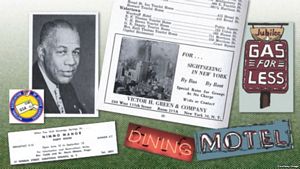|
By accessing or using The Crittenden Automotive Library™/CarsAndRacingStuff.com, you signify your agreement with the Terms of Use on our Legal Information page. Our Privacy Policy is also available there. |

Black-owned Travel Sites Today Reflect Black Guidebook of Past
|
|---|
|
|
Black-owned Travel Sites Today Reflect Black Guidebook of Past
Marissa Melton, VOA News
18 September 2016 (5:31PM)
 Victor H. Green (c. 1955) and Green Book page excerpts with sign artwork by Dan Rodda. (Courtesy photo from greenbookchronicles.com) Victor H. Green (c. 1955) and Green Book page excerpts with sign artwork by Dan Rodda. (Courtesy photo from greenbookchronicles.com)
|
"Yo! The Air B&B we're staying at is so nice, the neighbors thought we were robbing the place & called the cops!" That caption accompanied a selfie photo posted by Stefan Grant on October 9, 2015, featuring himself, an African American friend, and two Atlanta, Georgia police officers in the background.
Grant and a few friends had rented the house for the weekend during a music festival. On the web page of Noirbnb, a travel startup headed by Grant and partner Ronnia Cherry, the founders explain that "apparently the neighbors saw a bunch of Black people in the house and assumed they were robbing the place."
The situation ended with an amicable conversation between Grant's group and the police, who confirmed that the group had actually rented the place. The photo, posted on Grant's Twitter account (@STEFis DOPE), went viral, and after some less-than-satisfactory talks about the situation with Airbnb, he and Cherry recognized a business opportunity.
Noirbnb is geared toward people of color who have found Airbnb less than welcoming. Their mission statement says Noirbnb is meant "to not only provide safe and welcoming spaces for Black travelers to rent," but also to "connect the African Diaspora in each corner of the world. We want to ensure that our community feels welcome, wherever they choose to travel and never have to face discrimination on their journey."
The founders of Noirbnb note their link to history: a publication known as the
Green Book, printed between the years of 1936 and 1966, when travel for African-Americans was difficult and unwelcoming in many parts of the United States. It began as
The Negro Motorist's Green Book and was later changed to
The Negro Traveler's Green Book, when it expanded to add air and rail travel. The book was named after its author, New York City postal worker Victor Green, who compiled the Green Book annually until his death in 1960.
"Many people have said, 'We had no idea this existed. We kind of wish we had this book today.' We hear that a lot," says Becky Wible Searles, director and co-producer, with author Calvin Alexander Ramsey, of a documentary film called "The Green Book Chronicles."
"It started small," she says of the guide, which listed motels and restaurants that welcomed black travelers at a time when many businesses did not. It was a cultural touchstone to many blacks, but unknown to many others.
Wible Searles, an animation professor with the Savannah College of Art and Design in Atlanta, says the documentary team has found that people are eager to share their Green Book stories.
A line in Green's book said the guide was meant to help black travelers avoid "embarrassment" while traveling. Left unsaid was the fact that black travelers, caught in the wrong place at the wrong time, could face far worse.
One woman they met in Harlem, a historically black neighborhood in New York City, illustrated the dangers African Americans underwent when they traveled by car through so-called "sundown towns," where blacks were warned by highway signs to leave city limits before nightfall.
Paula Wynter, now a New York City artist, told the filmmakers that during the 1950s, her family once hid in the family Buick all night in a sundown town in North Carolina, trying to escape the notice of the local sheriff searching for them. "My sister was crying," she said. "My mother was hysterical."
"Green loved saving people from humiliation, hardship, and physical violence, but Green's dream was that the book would not be needed one day," author Ramsey told the New York Times in 2015. "He was hoping equality would mean his company would go out of business."
The Civil Rights Act, which outlawed discrimination based on race, color, religion, sex, or national origin, was passed in 1964. The Green Book ceased publication in 1966.
Meanwhile the founders of Noirbnb are mindful of their past. Starting a company to cater to minorities makes sense, Stefan Grant says in an email to VOA.
"In many ways, the Black community has to create spaces and solutions to our issues in regard to every aspect of our lives," he says. "That is what I believe the future of Blackness will be: us uniting as a people to solve our problems and make the world a better place for ourselves and for future generations."

















 Victor H. Green (c. 1955) and Green Book page excerpts with sign artwork by Dan Rodda. (Courtesy photo from greenbookchronicles.com)
Victor H. Green (c. 1955) and Green Book page excerpts with sign artwork by Dan Rodda. (Courtesy photo from greenbookchronicles.com)
